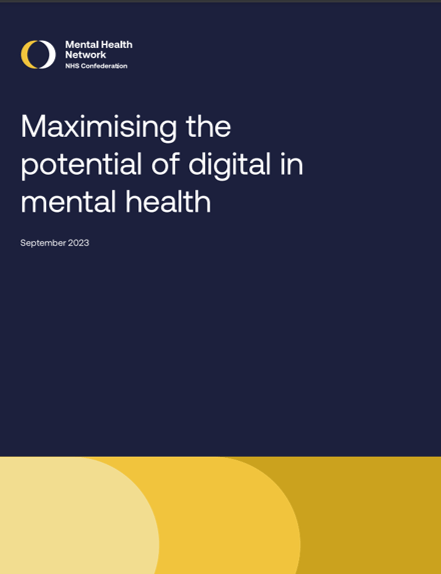“To do nothing is not an option”: The NHS Confederation releases digital mental health whitepaper
 The NHS Confederation–the membership organisation for healthcare providers in England, Wales and Northern Ireland– has just released a quite comprehensite 45-page whitepaper titled Maximising the potential of digital in mental health.
The NHS Confederation–the membership organisation for healthcare providers in England, Wales and Northern Ireland– has just released a quite comprehensite 45-page whitepaper titled Maximising the potential of digital in mental health.
Some of the highlights:
To do nothing is not an option. If we don’t make more progress we miss a key opportunity to make improvements to mental health services such as improving access; providing early intervention and prevention at scale; implementing new ways of reaching people; and helping to meet the demand supply gap; and at the same time opening up access so that inequalities in access to healthcare and support for mental health are reduced.
Digital technologies, platforms and applications are a reality within the delivery of mental health care pathways in England, and have an important role to play in improving the mental health of the population and the delivery of health services.
However, there are still barriers holding back progress, meaning that digital isn’t being fully utilised in tackling the biggest problems that mental health providers, commissioners, policy makers and the public face.
For digital to be an effective enabler for mental health services and towards improving population mental health, three principles are fundamental to future work: collaboration, clarity, and coordination between stakeholders.
From these principles, there are a range of building blocks needed for digital to be maximised in mental healthcare and population mental health, including a focus on building a shared narrative around needs-led solutions rather than technology led; working effectively within new and evolving local governance infrastructures such as integrated care systems (ICSs); and tackling inclusion and working together to build a modern, fit-for-purpose regulatory system.
This report highlights practical and achievable suggested discussion points that aim to bridge this gap and make a difference. They include a call for a wider and deeper national conversation on digital mental health and its future and consider developing effective ways of scaling digital mental health solutions in local and national solutions.
Why digital mental health?
-
Improved access: Digital mental health solutions can overcome geographical barriers, making mental health services more accessible to people in remote areas, those with limited mobility, and those who would prefer not to have in-person visits…
-
Early intervention and prevention: Digital tools can enable early detection of mental health issues by tracking patterns in behaviour and mood. Through data analysis, these tools can identify signs of distress and provide timely interventions, preventing conditions from worsening. Digital mental health tools, like mobile apps and wearable devices, can collect and analyse user data to detect early signs of distress. Machine learning algorithms can identify patterns in user behaviour, emotions, and engagement, triggering proactive interventions or providing personalised coping strategies.
-
Closing the demand-versus-supply gap: The demand for mental health services exceeds the available supply. Digital mental health technology can help bridge this gap by offering scalable solutions that reach a larger number of individuals simultaneously, and at lower cost. Digital mental health solutions can offer self-help resources, such as guided meditation and stress management apps, which empower individuals to manage their mental health independently. Additionally, virtual support groups and peer-to-peer platforms can foster a sense of community and reduce the burden on mental health professionals.
News in Context:
- UK agencies to review and update regulation of digital mental health tools
- The National Academy of Medicine (NAM) shares discussion paper to help empower 8 billion minds
- A call to action: We need the right incentives to guide ethical innovation in neurotech and healthcare
- The FDA creates new Digital Health unit to reimagine regulatory paths


